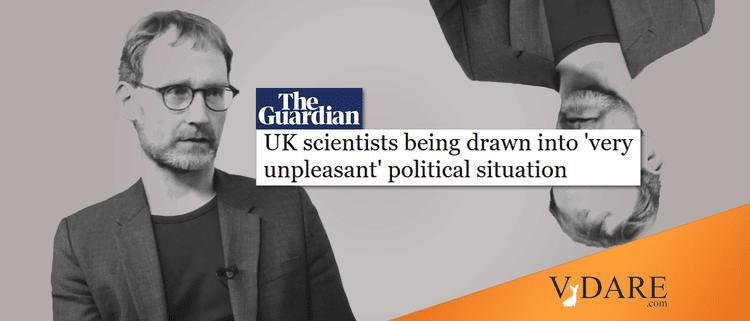
GUARDIAN Inverts Neil Ferguson Adultery Scandal to Make It Boring
By Steve Sailer
05/07/2020
As I like to point out, progressive broadsheets like The New York Times and the Guardian go out of their way to make the news less interesting. Here’s the Guardian on a hilarious scandal:
UK scientists being drawn into ‘very unpleasant’ political situation
Colleagues raise concerns after Prof Neil Ferguson stepped down from advisory role
Neil Ferguson is an epidemiologist at Imperial College London who was a top adviser to the UK government. He is, by the way, not the same person as financial historian Niall Ferguson.
Ian Sample, Kate Proctor and Rowena Mason
Wed 6 May 2020
Ferguson had become one of the most trusted voices on the outbreak.
Scientists who advise the government on its coronavirus strategy have warned they are being drawn into politics after the leading infectious disease modeller Prof Neil Ferguson stepped down as one of the cabinet’s most prominent advisers.
Ferguson, the head of the Imperial College team whose modelling persuaded ministers that Britain needed to order a lockdown to prevent hundreds of thousands of deaths, resigned from the Scientific Advisory Group for Emergencies (Sage) on Tuesday night.
Ferguson left the position after it emerged that his lover had visited his home on two occasions in March and April in a breach of the government’s official guidance on social distancing.
One scientific adviser to the government said Ferguson’s resignation had created “an awful lot of concern” and that the mood in the community was “very depressed”. The events revealed how university academics who lent their advice to government were having to cope with an increasingly difficult situation, the adviser added.
“He’s an academic researcher. He doesn’t make decisions. He’s not paid for any of this. We are being drawn into a political situation which is very unpleasant,” they said.
The prurient headlines about Neil Ferguson are a huge distraction
Ferguson had become one of the most trusted voices on the outbreak and took a prime role in discussing the reasons for the lockdown and social distancing measures. But that prominence led to him being portrayed as a decision-maker rather than an independent scientist whose team generated predictions that informed ministers about what strategies they might take.
“The media are presenting the scientists as decision-makers when they’re not. We are in the frontline when we shouldn’t be. We are not the story,” the adviser said. Unlike the government’s chief scientific adviser, Sir Patrick Vallance, and the chief medical officer, Professor Chris Whitty, the independent university academics who sit on Sage do not have teams to manage their media appearances and support them.
Scientists put forward a conspiracy theory:
Prof Anthony Costello, a former director at the World Health Organization, questioned why the story about Ferguson breaching social distancing rules a month ago was reported in the Daily Telegraph on the day that Britain’s official death rate overtook Italy’s, and before an imminent decision to relax the lockdown. Another scientific adviser who spoke to the Guardian said: “Ferguson was on the front pages when Britain having the highest death rate in Europe should have been splashed everywhere.”
The Telegraph revealed that Antonia Staats had crossed London from her family home to visit Ferguson on at least two occasions, on 30 March and 8 April, since lockdown measures were imposed.
